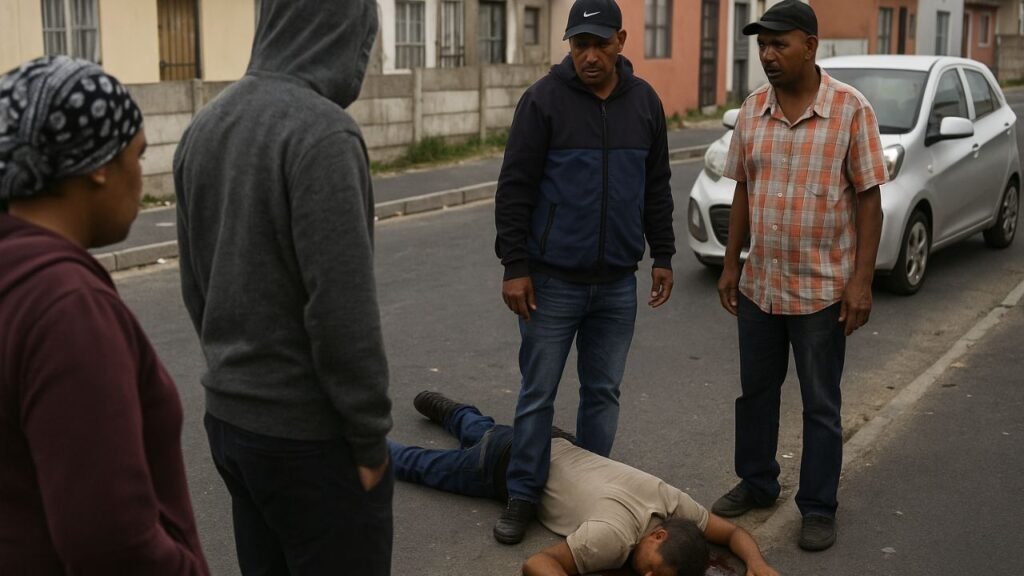Six shot dead in two days – Six shot dead in two days as Cape Town reels from gang violence is another stark reminder of how deeply entrenched crime has become in South Africa’s urban centers. In less than 48 hours, six people lost their lives to gang-related shootings that left entire neighborhoods living in fear. Residents in affected Cape Town suburbs describe hearing constant gunfire, forcing families to stay indoors and children to skip school out of fear for their safety. Local community leaders warn that unless the government strengthens law enforcement and expands youth support programs, the cycle of violence will continue to escalate. Gang warfare in Cape Town has historically been linked to drug trafficking, unemployment, and turf battles, with innocent residents often caught in the crossfire. According to reports by the South African Police Service and civic groups, there has been a sharp rise in targeted shootings over the past year, adding pressure on authorities to act swiftly before more lives are lost BBC News.

Escalating Violence Leaves Communities in Fear
Cape Town, despite its reputation as a tourist hub, continues to struggle with escalating gang wars that frequently claim innocent lives. The latest shootings occurred in areas already identified as hotspots for violent crime, leaving residents traumatized and helpless. Parents are increasingly afraid to allow their children to play outside or attend after-school activities, as stray bullets and drive-by shootings have become an almost daily occurrence. Community forums report that trust in law enforcement remains low, with many accusing the police of being either under-resourced or complicit in turning a blind eye. International observers, including rights groups such as Amnesty International, have highlighted how persistent inequality and weak policing strategies contribute to the unchecked growth of gangs in South Africa. Unless immediate interventions such as stronger policing, social upliftment programs, and stricter arms control are implemented, Cape Town risks further deterioration of safety and stability.
Government Response and Policing Challenges
The South African government has repeatedly pledged to address the rise in gang-related crime, but critics argue that responses remain largely reactive rather than preventative. In the aftermath of the recent shootings, police announced intensified patrols and targeted raids, but residents insist such actions often come too late and fail to dismantle the networks driving gang activity. Experts note that corruption within the police service further complicates matters, with some officers accused of collusion with gang leaders. Reports also show that illegal firearms continue to flow into the city, fueling deadly turf wars. Analysts believe that a holistic approach—combining law enforcement with youth employment programs, education initiatives, and community rehabilitation—is essential to breaking the cycle. Without such long-term strategies, Cape Town’s poorer neighborhoods risk remaining battlegrounds controlled more by gang hierarchies than by lawful governance Al Jazeera.
Impact on Families and Local Economy
Behind every headline of gang violence are families torn apart by loss, trauma, and financial hardship. Victims’ relatives often struggle with burial costs, counseling needs, and the long-term psychological effects of losing loved ones to violent crime. Small businesses in affected areas also report severe setbacks, as customers avoid shopping in high-risk neighborhoods and workers fear commuting through unsafe streets. The climate of fear restricts investment, slows local economic growth, and traps residents in cycles of poverty and vulnerability. Schools frequently shut down or operate under heightened security, creating educational setbacks for children who already face limited opportunities. Civil society organizations working on the ground argue that without addressing root causes such as poverty and social exclusion, government crackdowns will remain a temporary fix. A sustainable solution would require collaboration between government, local communities, and NGOs working on youth development and violence prevention DW News.
Possible Paths Toward Safer Communities
While the situation in Cape Town appears grim, experts stress that successful anti-gang strategies from other countries can offer valuable lessons. Initiatives that combine targeted policing with long-term socio-economic programs have proven effective in reducing gang recruitment and violent crime. Expanding job opportunities, offering youth mentorship, and investing in safer housing can help reduce the appeal of gang life. Moreover, stricter regulation of firearms, along with intelligence-driven policing, could significantly curb the frequency of deadly shootings. International cooperation and funding from global organizations might also play a role in strengthening South Africa’s response. Ultimately, Cape Town’s future depends on political will, community involvement, and transparent policing reforms. Unless meaningful change occurs, families will continue to suffer, and the city’s reputation will remain overshadowed by recurring bloodshed linked to unchecked gang rivalries Reuters.






